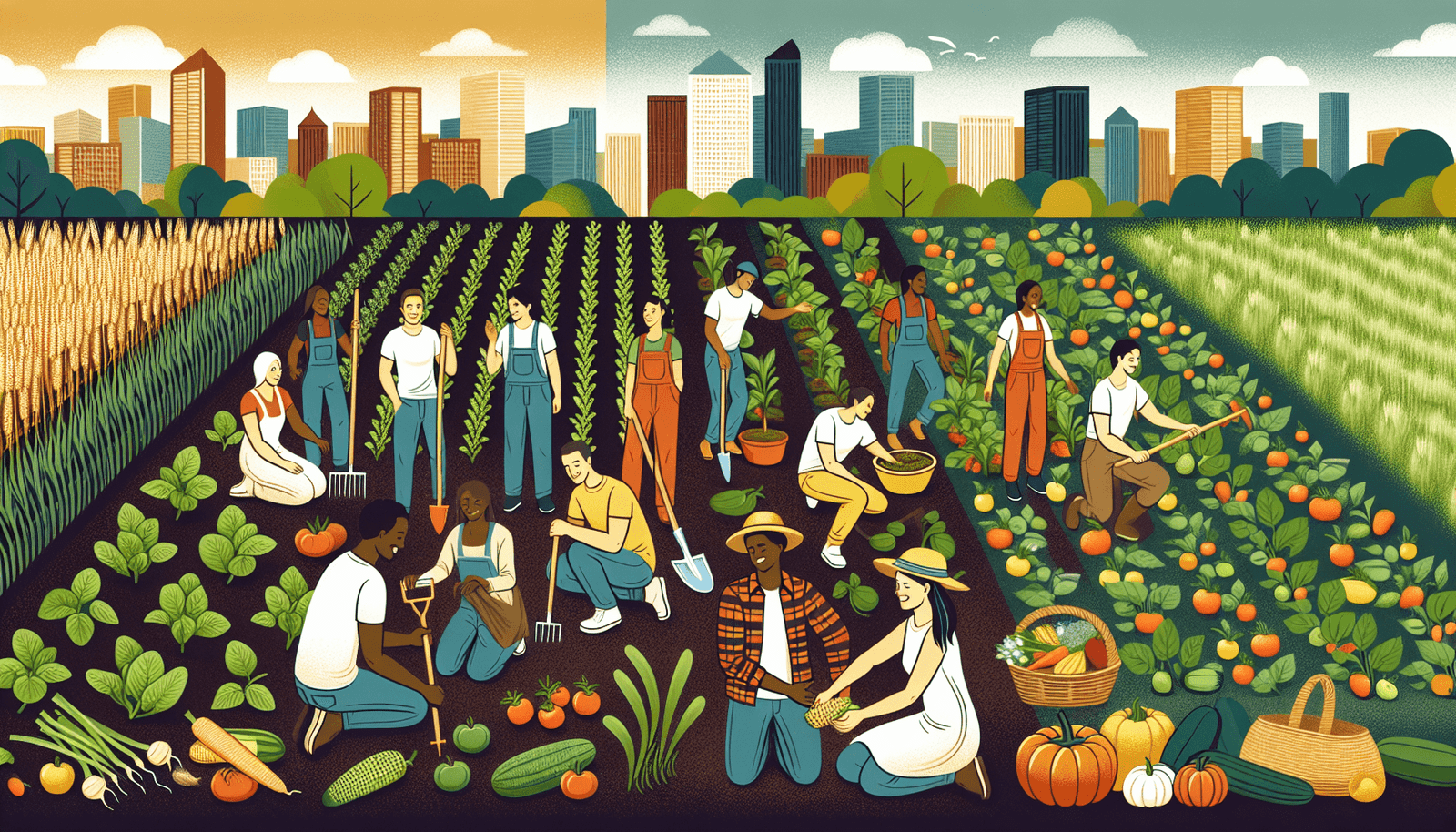Imagine a world where people come together, not only to grow their own food, but to build connections and foster a sense of community. Community agriculture, also known as community gardening, has been gaining popularity in recent years, and for good reason. This grassroots movement brings individuals from all walks of life together to cultivate and share fresh, organic produce, while reaping a multitude of additional benefits along the way. From improving physical and mental health to promoting sustainable practices and strengthening social ties, community agriculture offers an array of advantages that extend far beyond the garden beds. So, let’s uncover the numerous benefits of community agriculture and discover how it can transform not only our plates but also our lives.
Improved Access to Fresh, Local Produce
Increasing Food Security
Community agriculture plays a crucial role in increasing food security by providing improved access to fresh, local produce. By establishing community gardens, urban farms, and farmers markets, individuals and communities have the opportunity to grow and purchase nutritious food in their own neighborhoods. This eliminates the need for long-distance transportation and reduces reliance on industrial agriculture, which often requires the use of chemical pesticides and fertilizers. With community agriculture, you can be confident that the food you consume is not only fresh but also grown sustainably.
Promoting Healthy Eating
The availability of fresh, locally grown produce through community agriculture promotes healthy eating habits. Many communities lack access to affordable, nutritious food options, leading to a higher prevalence of diet-related diseases. Through community gardens and farmers markets, individuals have the opportunity to incorporate more fruits, vegetables, and herbs into their diets. This not only improves their overall nutrition but also supports optimal health, reducing the risk of chronic diseases such as obesity, diabetes, and heart disease. Community agriculture empowers you to make healthier choices and lead a more balanced lifestyle.
Reducing Environmental Impact
By participating in community agriculture, you contribute to the reduction of environmental impact caused by large-scale industrial agriculture. Locally grown produce eliminates the need for long transportation routes, thereby reducing greenhouse gas emissions. Moreover, community agriculture encourages sustainable farming practices such as composting, organic farming, and water conservation, minimizing the use of harmful pesticides and preserving the quality of soil and water resources. By supporting community agriculture, you are actively helping to protect the environment and preserve biodiversity for future generations.
Fostering Community Engagement
Creating a Sense of Belonging
One of the remarkable benefits of community agriculture is the creation of a strong sense of belonging within the community. Working together in community gardens or participating in farmers markets establishes a shared purpose and a common space for interaction. It brings people together from diverse backgrounds, fostering a sense of unity, inclusion, and solidarity. By engaging with your neighbors through community agriculture, you not only cultivate relationships but also develop a deep sense of pride and ownership in your community.
Strengthening Social Connections
Community agriculture acts as a catalyst for meaningful social connections. It provides opportunities for individuals of different age groups and backgrounds to come together and work towards a common goal. Whether you’re tending to the community garden or volunteering at a farmers market, you have the chance to engage in conversations, share knowledge and experiences, and build relationships founded on a shared passion for sustainable agriculture. These social connections not only enhance your personal well-being but also strengthen the fabric of the community as a whole.
Promoting Collaboration and Cooperation
Community agriculture thrives on collaboration and cooperation. From organizing community clean-ups to coordinating harvest festivals, individuals in a community actively work together towards shared goals. Through collective problem-solving and decision-making, community agriculture encourages collaboration and fosters a spirit of cooperation. By engaging in these joint efforts, you develop vital teamwork skills, learn from one another, and contribute to the overall well-being and growth of your community.

Education and Skill Development
Enhancing Agricultural Knowledge
Community agriculture serves as a valuable platform for enhancing agricultural knowledge. Whether you’re a seasoned gardener or have no prior experience, community gardens and urban farms provide opportunities for learning and skill development. Experienced volunteers often mentor newcomers, sharing their knowledge about planting techniques, crop rotation, pest control, and other aspects of sustainable farming. By participating in community agriculture, you gain practical skills and knowledge that empower you to grow your own food and make informed choices about sustainable agriculture practices.
Teaching Sustainable Practices
Sustainable agriculture practices are at the core of community agriculture. Through workshops, educational programs, and hands-on experience, community agriculture initiatives educate individuals about sustainable farming methods. These practices focus on conserving natural resources, minimizing waste, and promoting biodiversity. By learning about sustainable practices such as composting, natural pest control, and water conservation, you develop a deeper understanding of the environmental impact of your actions and become a steward of sustainable living.
Building Life Skills
Community agriculture also helps individuals develop essential life skills beyond agriculture. Through participation in community gardens, farmers markets, and other related activities, you cultivate skills such as problem-solving, time management, and communication. These skills are transferable to various professional and personal settings, improving your overall resilience and adaptability. In addition, community agriculture provides opportunities for leadership development, empowering you to take on meaningful roles and responsibilities within the community.
Empowering Individuals and Communities
Encouraging Self-Sufficiency
Community agriculture empowers individuals and communities by promoting self-sufficiency. By growing your own food and participating in local food initiatives, you become less dependent on external food sources. This not only reduces the risk of food scarcity in times of crisis but also allows you to have better control over the quality and freshness of the food you consume. Community agriculture helps you develop important skills and knowledge to sustainably produce your own food, empowering you to take charge of your nutrition and overall well-being.
Creating Economic Opportunities
Another significant benefit of community agriculture is the creation of economic opportunities within the community. As community gardens and urban farms flourish, they often generate surplus produce that can be sold through farmers markets or to local businesses. This helps support the local economy by providing income for individuals involved in community agriculture initiatives. Moreover, farmers markets and community-supported agriculture programs create a direct link between local producers and consumers, stimulating economic transactions and strengthening local businesses.
Improving Mental and Physical Well-being
Active participation in community agriculture positively impacts mental and physical well-being. Engaging in activities such as gardening and farming promotes physical exercise, leading to improved fitness levels and overall health. The act of nurturing plants and witnessing the fruits of your labor can be incredibly rewarding and therapeutic. Additionally, community agriculture provides a sense of purpose, connection, and belonging, which are vital for mental well-being. Whether you’re gardening or participating in community events, community agriculture fosters a positive and supportive environment for personal growth.

Preserving Cultural Heritage
Reconnecting with Traditions
Community agriculture plays a pivotal role in preserving cultural heritage by reconnecting communities with their agricultural traditions. Many cultures have deep-rooted traditions and practices related to agriculture that have been passed down through generations. By engaging in community gardens and urban farming initiatives, individuals can reconnect with these traditions, reviving cultural practices and preserving their heritage. Community agriculture serves not only as a means to grow fresh produce but also as a platform for cultural exchange and celebration of diversity.
Protecting Indigenous Knowledge
Indigenous knowledge related to agriculture and sustainable land use is invaluable for maintaining biodiversity and ecosystem health. Community agriculture initiatives actively involve indigenous communities, recognizing their knowledge and expertise. By creating spaces for indigenous individuals to share their wisdom and traditional agricultural practices, community agriculture helps protect and preserve their knowledge. In doing so, it contributes to the preservation of indigenous cultures and their unique relationship with the land.
Promoting Cultural Exchange
Community agriculture creates opportunities for cultural exchange and celebration. As individuals from diverse cultural backgrounds come together to participate in community gardens and farmers markets, they naturally share their unique perspectives, traditions, and culinary practices. This exchange of ideas fosters understanding, respect, and appreciation for different cultures within the community. Community agriculture becomes a vibrant melting pot of cultures, where food becomes a medium to bridge cultural gaps and promote inclusivity.
Environmental Benefits
Conserving Biodiversity
Community agriculture plays a crucial role in conserving biodiversity by promoting the cultivation of a wide variety of plants and crops. By growing diverse crops, community gardens and urban farms contribute to the preservation of heirloom and locally adapted plant varieties, preventing the loss of genetic diversity. This diversity is essential for long-term food security and resilience in the face of changing environmental conditions. Additionally, community gardens often incorporate elements such as pollinator-friendly plants and wildlife habitats, further supporting local biodiversity.
Mitigating Climate Change
Community agriculture actively contributes to mitigating climate change through various practices. By reducing the need for long transportation routes, community agriculture reduces greenhouse gas emissions associated with food production and distribution. Moreover, community gardens and urban farms play a role in sequestering carbon dioxide through the growth of plants, which naturally absorb CO2 from the atmosphere. Additionally, sustainable farming practices employed in community agriculture, such as composting and organic farming, help build healthy soils that enhance carbon sequestration.
Reducing Food Miles
The concept of “food miles” refers to the distance that food travels from its production site to the consumer’s plate. Community agriculture significantly reduces food miles by providing locally grown produce to the community. This not only reduces greenhouse gas emissions associated with transportation but also ensures that food reaches consumers in its freshest state. By choosing to support community agriculture, you actively contribute to reducing the carbon footprint of your food consumption and supporting a more sustainable food system.

Stimulating Local Economies
Supporting Local Farmers
Community agriculture initiatives play a vital role in supporting local farmers and producers. By creating avenues such as farmers markets, community-supported agriculture programs, and farm-to-table networks, community agriculture connects consumers directly with local farmers. This direct link ensures that farmers receive fair prices for their produce, reducing their dependency on middlemen and large corporations. By supporting local farmers, your participation in community agriculture stimulates the local economy and helps sustain the livelihoods of those dedicated to sustainable agriculture.
Creating Jobs
Community agriculture generates employment opportunities within the community. As community gardens, urban farms, and farmers markets grow, they require individuals to manage operations, facilitate educational programs, and provide various support roles. These jobs not only provide income for individuals but also contribute to the overall economic growth of the community. The creation of jobs in community agriculture allows individuals to engage in meaningful work that aligns with their values and contributes to the betterment of their community.
Boosting Local Businesses
The success of community agriculture initiatives has a positive ripple effect on local businesses. Farmers markets and community-supported agriculture programs provide opportunities for local food producers, artisans, and entrepreneurs to showcase and sell their products to the community. This boosts the visibility and viability of local businesses, strengthening the economic fabric of the community. By supporting community agriculture, you indirectly support the wider local business ecosystem, fostering a sustainable and vibrant economic environment.
Building Resilient Communities
Preparing for Crisis Situations
Community agriculture plays a vital role in building resilient communities, especially in times of crisis. During emergencies or disruptions in the global food supply chain, community gardens and urban farms provide a local source of fresh produce. This reduces the vulnerability of communities to food shortages and supports their ability to withstand unexpected situations. By actively participating in community agriculture, you contribute to the preparedness and overall resilience of your community.
Enhancing Disaster Recovery
In the aftermath of natural disasters, community agriculture serves as a powerful tool for disaster recovery. The cultivation of community gardens and urban farms fosters a sense of hope and renewal within the community. These spaces become gathering points for individuals to come together, recover, and support one another. Additionally, community agriculture can aid in rebuilding local food systems disrupted by disasters, ensuring that communities have access to fresh, nutritious food in their time of need.
Promoting Social Justice
Community agriculture contributes to promoting social justice within communities. By creating accessible spaces for growing food, community gardens and urban farms address food insecurity and provide opportunities for marginalized individuals and communities to reclaim their food sovereignty. These initiatives prioritize inclusivity and ensure that everyone has equal access to nutritious food and the benefits of community agriculture. By engaging with community agriculture, you actively participate in the promotion of social justice and equal opportunity for all.

Promoting Sustainable Land Use
Maintaining Soil Health
Community agriculture places a strong emphasis on maintaining soil health. Sustainable farming practices employed in community gardens and urban farms, such as composting and cover cropping, help improve soil fertility and structure. By enriching the soil with organic matter and minimizing the use of chemical inputs, community agriculture ensures that the land remains productive and resilient. Healthy soil is not only essential for growing nutritious food but also plays a crucial role in mitigating climate change by sequestering carbon.
Conserving Water Resources
Water conservation is a key focus of community agriculture. Through practices like rainwater harvesting, drip irrigation, and mulching, community gardens and urban farms reduce water usage while maintaining healthy plant growth. By adopting these water conservation techniques, community agriculture contributes to the responsible use of this precious resource and minimizes the strain on local water supplies. As water scarcity becomes a growing concern, supporting community agriculture becomes even more crucial in ensuring sustainability.
Minimizing Pesticide Use
Community agriculture promotes the minimization of pesticide use through the adoption of organic and natural pest control methods. By relying on integrated pest management strategies, community gardens and urban farms prioritize the use of biological controls, crop rotation, and companion planting to manage pests and diseases. This reduces the reliance on chemical pesticides, which can have harmful effects on human health and the environment. By supporting community agriculture, you contribute to the preservation of natural ecosystems and the protection of beneficial insects and pollinators.
Enhancing Urban Spaces
Transforming Vacant Lots
Community agriculture transforms vacant lots into vibrant, productive spaces within urban environments. Abandoned or underutilized areas are converted into community gardens or urban farms, reclaiming neglected spaces and bringing them to life. These urban green spaces not only improve the aesthetic value of neighborhoods but also provide opportunities for community engagement, education, and food production. By transforming vacant lots into productive urban spaces, community agriculture enhances the overall livability and sustainability of cities.
Beautifying Neighborhoods
The presence of community gardens and urban farms brings beauty and vitality to neighborhoods. Lush gardens and thriving plots of land serve as visual focal points, creating a sense of serenity and natural beauty amidst the urban landscape. Beautifully maintained community gardens uplift the aesthetics of neighborhoods, making them more attractive and inviting to residents and visitors alike. The beauty and vibrancy of these spaces act as catalysts for community pride and cohesion.
Reducing Urban Heat Island Effect
The urban heat island effect, characterized by higher temperatures in urban areas compared to surrounding rural areas, is mitigated by community agriculture. The presence of vegetation and green spaces created by community gardens and urban farms helps cool the surrounding environment. Plants provide shade, release moisture through transpiration, and reduce the overall temperature, making neighborhoods more comfortable and reducing energy consumption for cooling. By supporting community agriculture, you actively contribute to combating the urban heat island effect and creating a more sustainable, pleasant urban environment.
Community agriculture offers a multitude of benefits that reach far beyond the boundaries of food production. It enhances access to fresh, local produce, promotes healthy eating habits, and reduces the environmental impact of food production. Additionally, community agriculture fosters community engagement, strengthens social connections, and promotes collaboration and cooperation. It serves as a platform for education, skill development, and empowerment, while also preserving cultural heritage and promoting cultural exchange.
From an environmental perspective, community agriculture conserves biodiversity, mitigates climate change, and reduces food miles. The economic benefits of community agriculture are substantial, supporting local farmers, creating jobs, and boosting local businesses. Moreover, community agriculture plays a pivotal role in building resilient communities, preparing them for crisis situations, enhancing disaster recovery, and promoting social justice. It also encourages sustainable land use practices, enhances urban spaces, and reduces the urban heat island effect.
With its varied benefits, community agriculture holds immense potential to transform our communities and create a more sustainable and inclusive future. By actively engaging in community agriculture initiatives, you become an integral part of this positive change, contributing to the well-being of individuals, communities, and the planet as a whole. So, roll up your sleeves and join the vibrant community agriculture movement – together, we can make a difference.



